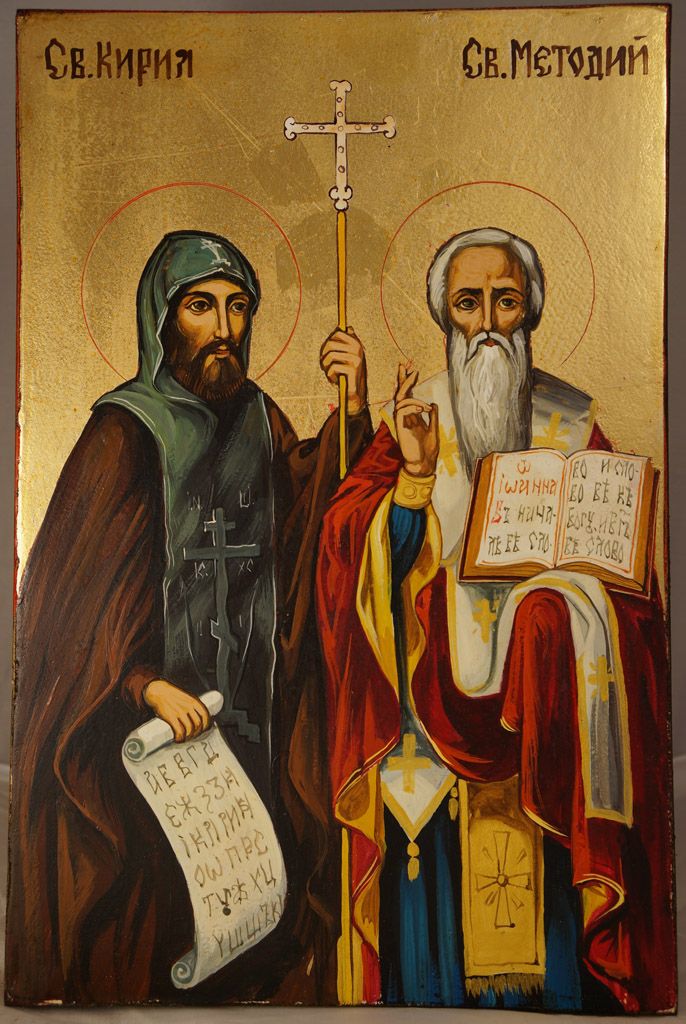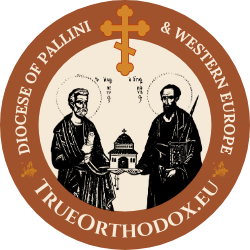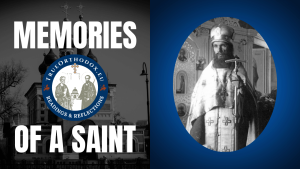Dialogues of Ss. Cyril and Methodius with Muslims

The Orthodox Church, as the pillar and ground of the Truth (1 Tim. 3:15), has from apostolic times been called to defend the pure teachings of Christ against all falsehoods. Among the great champions of Orthodoxy stand our Holy Fathers Cyril (known as Constantine the Philosopher before he became a monk) and Methodius, whose wisdom was a divine gift for the confirmation of the faithful and the refutation of error.
Before their renowned mission to the Slavic peoples, St. Constantine the Philosopher was sent by the Emperor to the Saracens (Muslims) to engage their learned men concerning the Faith. The following passages, drawn from the Life of these Saints by St. Demetrios of Rostov, present these crucial dialogues. We see St. Constantine, with grace and profound theological insight, defending the foundational dogmas of our Faith – particularly the Most Holy Trinity and the Divine Incarnation of our Lord Jesus Christ – against the denials inherent in Islam.
For True Orthodox Christians in every age, surrounded by a multitude of deceptive teachings, the unwavering witness of saints like St. Cyril is a beacon. His words remind us that Orthodoxy alone holds the fullness of God’s revealed Truth:
The blessed Constantine held conversations not only with the Jews, but also with the Saracens, whom he also confuted with the help of our Lord, Who promised His servants to give them “a mouth and wisdom, which all your adversaries shall not be able to gainsay nor resist” (Luke 21:15).
Hearing such sweet words, fitting for the Christian faith, the Khagan and his chief counsellors said to Constantine: “God has sent you to us for our instruction. From Him you have learned the books, have spoken everything correctly, and with the honeyed words of the holy books have nourished us to satiety. Although we are unlearned men (‘unlettered folk’), yet we believe that this teaching is from God. If, however, you wish finally to set our souls at rest, then tell us not only from books, but also through comparisons (parables) about all that we shall ask you concerning the faith.”
After this, all dispersed to rest. On the next day, they gathered again and said to Constantine: “Prove to us, most honourable man, by reasoning and comparisons, which faith is the best?”
“A certain King,” replied the philosopher, “held a husband and wife in great honour. When they sinned, He exiled them from the land where they lived (from paradise). Many years they lived there and in poverty bore children. Gathering together, the children deliberated how they might regain the dignity of their parents. One said one thing, another another; each gave advice which, in his opinion, should be followed. Which of these counsels should have been followed? Was it not the best one?” Constantine said, finishing his comparison.
“Why do you say so?” replied the Khazars. “Each considers his own counsel better than another’s. You tell us, so that we may understand, which of these counsels is the best?”
“Fire,” replied the philosopher, “purifies gold and silver, but man by his intellect distinguishes falsehood from truth. Tell me, from what did the first sin arise: was it not from the sight of the sweet fruit and the desire to be as gods?”
“So it was,” replied the Khazars.
The philosopher continued: “If honey or cold water is harmful to a sick person, which physician will give better advice: he who says to one to whom honey is harmful – ‘eat honey,’ and to one to whom cold water is harmful – ‘drink cold water and stand naked in the frost,’ or he who will give medicine contrary to the harm: instead of honey – with caution a bitter drink, instead of cold water – something warm and warming?”
“Of course,” said all, “he who gives contrary medicine will give better advice. So also, sin-loving desire should be mortified by the bitterness of life, and pride by humility – generally, the contrary should be treated with the contrary. We notice that if a berry bush in spring is covered in sharp thorns, then in autumn it yields good, sweet fruit.”
“You have spoken well,” replied Constantine. “And the law of Christ says that to live according to God means to lead a harsh life (to follow the narrow path), which in the eternal dwelling will yield fruit a hundredfold.”
After this, one of the Khagan’s chief counsellors, who knew well the impious teaching of Mohammed, asked the philosopher: “Tell me, guest, why do you not honour Mohammed? For he greatly praised Christ in his books and said of Him: of a Virgin, sister of Moses, was born a great prophet, Who raised the dead and with great power healed every sickness.”
“Let the Khagan himself judge between us,” said the philosopher. “Tell me, if Mohammed is a prophet, shall we then believe Daniel, who said that with Christ all vision and prophecy would cease? How then after this can he be a prophet? Therefore, if we call Mohammed a prophet, it means we reject Daniel.”
To this many of those present said: “We know that Daniel prophesied by the Spirit of God, but of Mohammed we know that he is a liar and a destroyer of the salvation of many.”
Then the Khagan’s first counsellor turned towards the Jews and said: “With God’s help, the guest has cast all Saracen pride to the ground, and yours, like filth, he has thrown out.” Then he turned to all present and said: “God has given authority over all peoples and perfect wisdom to the Christian emperor; their faith is the best, and outside of it, eternal life cannot be attained.”
All said: “Amen.”
After this, the philosopher, with tears in his eyes, turned to all and said: “Brethren, fathers, friends, and children! Behold, with God’s help, we have explained and answered everything according to its merit. If even now any of you has not understood something, let him come and ask me about it. Whoever heeds this teaching, let him be baptised in the name of the Holy Trinity; but whoever does not heed, I will have no sin in this, but he will see his sin on the Day of Judgement, when the Judge, the Ancient of Days, will sit to judge all nations.”
To this the Khazars with the Khagan replied: “We are not enemies to ourselves, and so we decree: from this time, whoever wishes and whoever is able, let him, having considered, approach baptism. And whoever bows to the west (pagans), or performs Jewish prayers (Jews), or holds to the Saracen faith (Mohammedans), he shall receive a swift death.”
Having made this decision, all dispersed with joy. Two hundred Khazars abandoned idolatrous abominations and lawless cohabitations and accepted the Christian faith.







